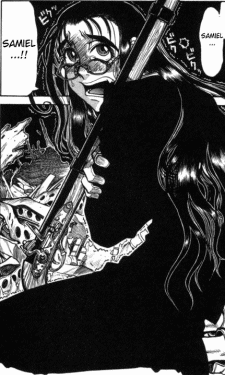Rip and Der Freishütz
(Thanks to p. and another
Erin for some of this info. One source: Stories of the Great Operas
and their Composers by Ernest Newman, Knoff 1928.)
In the fifth volume of the manga, Rip begins singing lyrics from the German musical Der Freishütz (approximately, in English, "The Freeshooter"). Its connections to her are similar to Alucard's connections to Dracula.

The composer, Carl Maria von Weber, led a sad, difficult life. Much of his music met with opposition because the trend of the time was Italian opera and music; the German Singspiel (a play with music) was considered inferior. This was further complicated by the royal house being Catholic; ties to Italy were thus nearly unbreakable. (Der Freishütz was first performed in 1821.)
Weber was also considered a Nationalist because of Kamph und Sieg (Conflict and Victory), which he wrote to celebrate the victory in Waterloo. Understandably, the Royal House frowned on anyone stirring up nationalist thoughts. Germany had not been one country until recently; there were lots of German states, which began uniting to form "the Second Reich." (The First Reich was historical; the Third Reich, of course, was Hitler.) Nevertheless, the now-whole German country was in need of a sense of national identity; Weber was one of the people who tried to give it that. He also set the stage for Richard Wagner, who became Hitler's favorite composer because of the prevalent nationalist themes in his works. (Not that either composer was a Nazi, understand.)
A note: Weber's father, Franz Anton, took his sons to Vienna to be pupils of Joseph Haydn. While there, they stayed with the von Brenner family. This suggests a source for the pseudonym J. H. Brenner, used by Alucard in Brazil.
 Some characters of Der Freishütz:
Some characters of Der Freishütz:
Samiel - the Black Huntsman/Devil, described as a huge figure dressed in dark green and flame-colored clothing with a hat.
Max - the hero, betrothed to Agatha and scheduled to succeed her father as head ranger. He must make an impossible shot to be worthy of his bride, so he makes a deal with Caspar to use the magic bullets. (Max is also the name of Weber's son.)
Caspar - made a deal with Samiel to win Agatha from Max by making the shot. Samiel gives Caspar seven magic bullets; the first six, when shot, will hit any target, but the seventh will be guided by Samiel. In exchange for the bullets, Caspar will deliver Max's soul to Samiel.
Der Freischütz is based on a popular tradition in German folklore, researched by Weber's friend Friedrich Kind, who wrote the libretto (the lyrics and spoken passages). It took Kind only a week to write, but Weber didn't write the first piece for almost four months.

Rip the Hunter uses a gun with "magic bullets" which are able to hit any target, to devastating effect. Nevertheless, the tradition used in Der Freishütz comes back to haunt her. Accordingto the folklore, a hunter can obtain the magic bullets in exchange for his soul, and substitute the soul of another - but if the hunter fails to fool someone else into taking his place, he is the one taken to Hell. Those who would deal with the damned shall eventually join them.
When Alucard lands on the ship that Rip took over, she has a brief flashback to a scene in which the Major is lecturing her. He equates her with Caspar in Der Freishütz, warning her that her use of the magic bullets may lead to her downfall. In the present, it becomes clear that Alucard here is playing the role of Samiel. (Whether this means Alucard gave Rip the magic bullets in the first place - or perhaps turned her into a vampire - is unknown.)

One final observation: On page 74 of volume 5, Alucard is speaking
in German; he's quoting a line of Samiel's from the opera:
Es sei. Bei den Pforten der Hölle!
"So be it, by the gates of hell!"